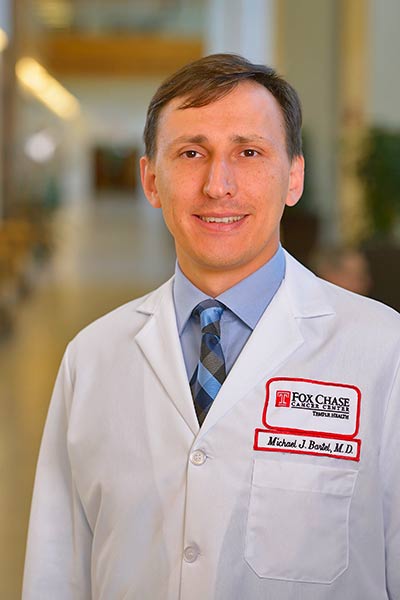
Heartburn and Cancer: Understand the Potential Risk
-
Updated: February 3, 2020
No one likes having heartburn—that burning feeling in the throat and chest. If heartburn is only an occasional nuisance, it’s usually nothing to worry about. But frequent bouts of heartburn could signal a condition called GERD, which, in rare cases, can lead to esophageal cancer.
What is GERD?
Gastroesophageal reflux disease (GERD) happens when the strong acid and enzymes in the stomach escape—or reflux—into the lower part of the esophagus. This can trigger heartburn or pain in the middle of the chest or an unpleasant taste in the back of the mouth.
“GERD is a very common condition,” said Michael Bartel, MD, PhD, a gastroenterologist at Fox Chase Cancer Center. “It’s fairly easy to treat just by adjusting your diet. There are certain foods that can trigger GERD, such as coffee, chocolate, and tea. It also helps to not eat before bedtime.”
Over-the-counter medications are frequently used for treating GERD, too.
“Overall, GERD is not a dangerous condition,” Bartel said. “But unfortunately, GERD can sometimes lead to Barrett’s esophagus. And Barrett’s esophagus is associated with esophageal cancer, which is a serious condition.”
What is Barrett’s esophagus?
The longer someone has GERD, the greater the risk that the inner lining of their esophagus will become damaged from the reflux of stomach acid. This damage can cause the cells that normally line the esophagus to be replaced with abnormal cells that are more like the ones that line the stomach and small intestine—causing a condition called Barrett’s esophagus.
Over time, the cells in Barrett’s esophagus can become increasingly abnormal and result in dysplasia, a precancerous condition. People with Barrett’s esophagus are at a much higher risk for developing esophageal cancer, according to the American Cancer Society.
Barrett’s esophagus is diagnosed with an upper endoscopy—dropping a cable with a tiny camera into the throat to examine the lining of the esophagus and to take a sample of tissue for a biopsy.
But most people with Barrett’s esophagus do not develop esophageal cancer, and not every person with GERD needs to be tested for Barrett’s esophagus.
“We want to identify patients at risk for esophageal cancer,” Bartel said. “If they are a GERD patient who fulfills certain criteria—white, male, overweight, and they smoke—they may benefit from an upper endoscopy to see if they have Barrett’s esophagus,” Bartel said. “For most other patients, it’s a grey zone.”
Barrett’s esophagus is twice as common in men as in women. It tends to impact white, middle-aged men who’ve had heartburn for many years.
In order to prevent cancer, patients with higher risk Barrett’s esophagus can be treated with so-called ablation, which is the application of heat or mucosal resection to remove the inner lining of the esophagus, reducing the risk of developing esophageal cancer in people who have Barrett's esophagus.
Personalized care
Because not everyone with GERD needs to be tested for Barrett’s esophagus, Bartel takes the time to explain the pros and cons of testing for the condition.
“At the end of the day, I can’t make a decision for a patient,” he said. “But patients who are better able to understand are better able to make informed decisions. I help patients decide what they want. Personal care—that’s the way I try to practice. And at Fox Chase, I have the time I need to spend with patients and practice that kind of care.”
To make an appointment with a Fox Chase gastroenterologist, call 888-FOX-CHASE (888-369-2427) or request an appointment online.
